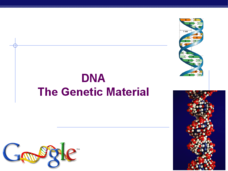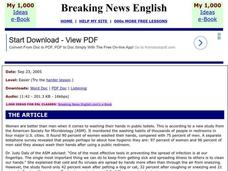Curated OER
Diversity of Life: Pathogens
Students research bacteria and viruses that carry pathogens. In this diversity lesson, students examine how pathogens spread disease through bacteria and viruses. Students write a report on disease caused by bacteria or virus including...
The New York Times
Sequencing the Stages: Understanding H.I.V. Infection at the Molecular Level
How does HIV operate at the molecular level? Pupils discover the progression from a healthy immune cell to one infected with HIV, watch an animation of the HIV life cycle, and finally identify each of the stages with illustrations...
Children’s Hospital of Philadelphia
Case Study: The 1918 Influenza Pandemic – Factors Beyond the Biological that Influence the Spread of Disease
A very timely activity looks at the social and political factors that affect the spread of disease. Using the 1918 Influenza Pandemic as a case study, pupils research factors that influenced the spread of the disease, including the role...
Curated OER
DNA: The Genetic Material
The various experiments and processes that were completed in the 20th century to further our understanding of DNA are summarized here. There are wonderful slides to popularize the scientists who dedicated their professional life to...
Curated OER
Germs and Preventing Illness: An Inner and Outer
First graders looks at germs through a microscope and identify two that can make us sick. They compare their mouth before and after they brush their teeth and practice proper hand washing techniques. They study the impact of Edward...
Curated OER
The Hopes of Our Ancestors: The Impact of Immigration on America
Students research the immigration of America. In this American immigration lesson, students complete a unit of activities to learn about American immigration.
Curated OER
Breaking News English: Women Wash Hands More Often Than Men
For this English worksheet, students read "Women Wash Hands More Often Than Men," and then respond to 47 fill in the blank, 7 short answer, 20 matching, and 8 true or false questions about the selection.
Curated OER
Breaking News English: Women Wash Hands More Often Than Men
In this English worksheet, learners read "Women Wash Hands More Often Than Men," and then respond to 47 fill in the blank, 7 short answer, 20 matching, and 8 true or false questions about the selection.
Curated OER
Weapons of Mass Desctruction in Iraq
High schoolers analyze the chemical and biological weapons of mass destruction that Iraq is accused of having. Students investigate the history and resolutions that have been made regarding bioterrorism.
TED Talks
Ted: Ted Ed: How Pandemics Spread
A discussion about the globalization of disease, and the implications of a pandemic. Mark Honigsbaum describes the history of pandemics and how scientists can help prevent future outbreaks. [8:00]
A&E Television
History.com: Social Distancing and Quarantine Were Used in Medieval Times to Fight the Black Death
Way back in the 14th century, public health officials didn't understand viruses, but they understood the importance of keeping a distance and disinfecting. Almost 700 years ago, the overwhelmed physicians and health officials fighting...
Virginia Historical Society
Virginia Historical Society: Waging War: The Battlefront: The Deadliest Enemy?
Discusses how bacteria and viruses killed many more Civil War soldiers than wounds from weaponry. Presents some of the medical instruments used by military doctors, and an artificial leg invented by the first amputee of the war, James E....
Khan Academy
Khan Academy: The Columbian Exchange
The rapid pace of globalization today is a continuation and acceleration of processes that began 500 years ago. This article discusses that not only humans started to travel the world, but also plants, species, bacteria, and viruses....
Other popular searches
- Bacteria and Virus
- Fungi Bacteria and Virus
- Bacteria and Virus Crossword
- Bacteria and Virus Test
- Bacteria Virus
- Biology Bacteria and Virus
- Bacteria Virus Protist
- Fungus Bacteria Virus
- Bacteria and Virus Video
- Bacteria and Virus Review
- Bacteria and Virus Anatomy
- Biology Virus Bacteria












